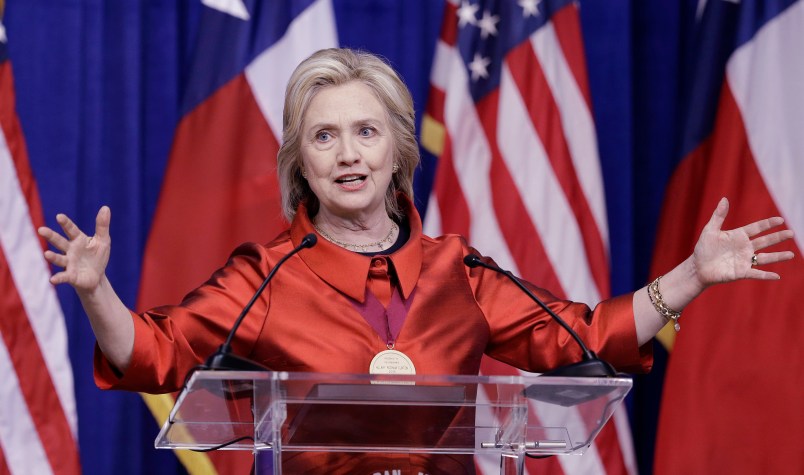Receiving an award in honor of the late Rep. Barbara Jordan (D-TX), a champion of voting rights, Hillary Clinton gave an impassioned speech on the topic Thursday, ripping into Republicans for passing laws that restrict citizens’ ability to vote while proposing her own ideas for broadening the franchise.
“What is happening is a sweeping effort to disempower and disenfranchise people of color, poor people and young people from one end of our country to the other,” Clinton said, blaming the Supreme Court for “eviscerating” a part of the Voting Rights Act in 2013.
In addition to calling on Congress to restore the provision of the Voting Rights Act nixed by the Supreme Court, Clinton also proposed automatic voting registration for every citizen when he or she turns 18, as well as at least 20 days of early voting nationwide.
The speech won the praise of civil rights activists.
“Finally, a presidential candidate is acknowledging the rampant voting discrimination that has surged since the Voting Rights Act was gutted in 2013,” Wade Henderson, president and CEO of The Leadership Conference on Civil and Human Rights, said in a statement after the speech. “Voting is a cornerstone of our nation’s commitment to democracy, and Clinton’s acknowledgment of its importance is noteworthy.”
In recent years a number of states have passed laws that have made it harder to vote — such as voter ID requirements and cutbacks to early voting. Thursday, Clinton criticized such efforts, and particularly the Republican lawmakers who typically support them.
“I call on Republicans at all levels of government with all manner of ambitions to stop fear-mongering about a phantom epidemic of voter fraud and start explaining why they’re so scared of letting citizens have their say,” Clinton said.
She called out Texas Gov. Rick Perry, Wisconsin Gov. Scott Walker, New Jersey Gov. Chris Christie and former Florida Gov. Jeb Bush for either supporting efforts to limit voting or vetoing laws that would have expanded voting rights. All four are running or expected to run for the Republican presidential nomination.
“Voting should not be a partisan issue and there are some good voting reforms that have been endorsed by members of both parties,” said Jonathan Brater, counsel the Brennan Center’s Democracy Program, a nonpartisan organization that advocates for voting rights.
Clinton also bashed the Supreme Court’s decision in Citizens United, as well as its recent decision to review a case that could undermine the principle of “one person, one vote.”
“We need a Supreme Court who cares more about the right to vote of a person than the right to buy an election of a corporation,” she said.
Clinton made her remarks at Texas Southern University, an historically black-college in Houston whose students have been involved in challenges to Texas’ voting restrictions.
“The choice of location was really apt,” said Natasha Korgaonkar, counsel at the NAACP Legal Defense Fund who is involved in the lawsuit against Texas’ voter ID law. “It’s really important that issues of voting rights and expanding the right to vote as well as blocking restrictive voter laws are part of the national dialogue.”
Exciting civil rights activists and those Clinton said were most hurt by Republican voting laws — minority, young people, and the elderly — was the point of the speech, said Rick Hasen, a professor at UC-Irvine School of Law who also runs the Election Law Blog.
“They are quite good ideas, many of things she suggested, but this was a speech aimed at the Democratic base, not aimed at [changing] policy,” Hasen said. “You don’t get cooperation on this issues by saying to Republicans, ‘What part of the democracy do you not understand?’”
The issue isn’t likely to go away, as Clinton’s top campaign lawyer has recently filed challenges to the voting laws in Wisconsin and Ohio. (The litigation is technically separate from Clinton’s campaign.)
“There’s a political dynamic to be sure,” Brater said. “But at at the same time, the focus on these issues by high profile leaders is reflective of the fact that a lot of these restrictive laws are being passed.”







A National ID card is what should be issued to everyone with a SS number, that takes care of any mythical voter problems the republicans claim their ID laws do. But oddly enough, they HATE the idea of a National ID card…weird.
The part where people get to vote.
Yep. The ‘theorist’ so admired by Jeb Bush, is Charles Murray, author of the Bell Curve who also firmly believes that only the elites should rule. He is against democracy straight out.
Go, Hillary! Get the headlines away from the clown car. And wear red more often!!
No, there hasn’t been good reforms from both sides. One side is actively working on creating obstacles to voting, the other isn’t. Stop playing this fucking false equivalency game.